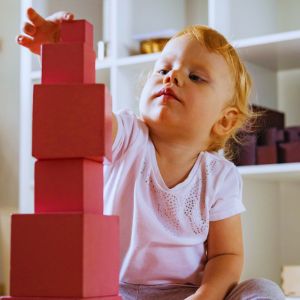In daycare environments, these valuable lessons bloom naturally. Through carefully crafted group tasks and free play opportunities, children discover ways to solve problems, share ideas, and build bonds. These spaces provide a foundation for young learners, fostering the tools needed for positive relationships and lifelong success.
Table of Contents
What Is Cooperative Play?
Cooperative play emerges as a transformative phase in a child’s development, where interaction takes center stage. Cooperative play entails working together to achieve common objectives, in contrast to earlier play phases such as solitary play, in which a kid plays alone, or parallel play, in which children play side by side without interacting. Children usually reach this milestone between the ages of two and three, at which point their social awareness and communication abilities advance significantly.
Through this stage, young learners engage in activities that require collaboration, like building towers together, organizing pretend adventures, or solving puzzles as a group. These moments teach essential social skills, such as negotiation, where children learn to voice their needs and find compromises, turn-taking to foster patience and fairness, and conflict resolution to navigate disagreements constructively. Cooperative play is more than shared fun—it’s a cornerstone of emotional growth and social mastery, shaping confident individuals ready to interact harmoniously with others.
Why Cooperative Play Matters in Early Childhood
Cooperative play is a foundation for social, emotional, and cognitive growth in early childhood. It shapes critical skills that help children navigate relationships, build independence, and thrive in diverse settings.
Development of Social Skills
Cooperative play nurtures essential abilities that influence how children interact with others:
- Empathy: By engaging with peers, children recognize emotions, respond with care, and develop a deeper understanding of others’ perspectives.
- Communication: Collaborative activities require sharing ideas, expressing thoughts, and actively listening to peers—key elements of meaningful interaction.
- Conflict Resolution: When disagreements arise, cooperative play provides opportunities to practice problem-solving and reach compromises peacefully.
Building Confidence and Independence
Participation in group activities bolsters self-esteem and inspires a sense of achievement:
- Collaboration: Successfully working with others gives children a tangible sense of accomplishment, reinforcing their abilities and building self-confidence.
- Exploration and Initiative: In group settings, children feel encouraged to share ideas, lead tasks, and take creative risks, fostering independence within a supportive framework.
Preparation for Future Relationships and Learning
The benefits of cooperative play extend far beyond early childhood:
- Teamwork: The capacity to collaborate well with others is essential in both academic and interpersonal contexts.
- Community and Belonging: Children who participate in group activities develop a sense of belonging and feel appreciated by their peers.
Children who engage in cooperative play develop lasting skills that help them overcome obstacles, build positive connections, and face new situations with courage and empathy. Every developmental stage is affected, and it creates the foundation for success on both a social and personal level.
Examples of Cooperative Play in Daycare Settings
Daycare environments, like ours at Bradford Children’s Academy, provide countless opportunities for children to engage in cooperative play, encouraging growth through structured and free-form activities.
Team Projects
Building block towers and assembling puzzles are two great examples of activities that foster collaboration. Children must cooperate, exchange ideas, and work toward a shared objective in order to complete these activities.
- Benefits: As kids choose tactics and responsibilities within the group, these projects foster patience, teach bargaining, and improve problem-solving abilities.
Creative Arts
Group art activities, like painting or creating collaborative crafts, inspire young learners to unleash their imagination while working side by side. Sharing materials and brainstorming designs strengthens their sense of cooperation.
- Benefits: Creative arts encourage sharing, foster open communication, and provide a space where children can express themselves collectively.
Pretend Play and Role-Playing
Whether children run a “pretend restaurant,” play superheroes, or take on the roles of cashier and shopper, role-playing activities allow them to navigate different perspectives and scenarios.
- Benefits: Pretend play sharpens empathy, sparks the imagination, and strengthens decision-making skills as children determine roles and solve pretend challenges together.
Outdoor Games and Sports
Physical activities like tag, relay races, or obstacle courses require children to coordinate efforts and work as a team to succeed. These games are enjoyable and foster collaboration in an active setting.
- Benefits: Outdoor play promotes physical coordination, encourages teamwork, and reinforces the value of shared effort in achieving goals.
At Bradford Children’s Academy, we foster an atmosphere that encourages cooperative play and helps kids develop important social skills while having fun. Make an appointment with us right now to see how your kid may thrive in our caring and stimulating programs!
How Daycare Encourages Cooperative Play
Daycare settings are uniquely equipped to foster cooperative play, offering a blend of structured guidance and supportive environments that nurture collaboration.
Structured Activities
Daycare staff design group games and collaborative tasks to match children’s developmental levels, ensuring activities challenge their skills while remaining engaging. Projects like building together, team games, and group storytelling encourage kids to cooperate toward shared goals, developing patience and teamwork.
Safe and Inclusive Environments
A welcoming atmosphere is essential for children to feel confident engaging with peers. Daycare centers, like Bradford Children’s Academy, prioritize creating spaces where young learners can express themselves freely and comfortably. This inclusivity fosters friendships and a sense of belonging, laying the groundwork for cooperative play.
Role of Educators
By facilitating group interactions, managing conflicts, and setting an example of constructive behavior, teachers play a critical role in fostering cooperation. Their assistance teaches kids how to properly negotiate social dynamics, share ideas, and settle disputes in a positive way.
Parental Involvement
Daycares often invite parents to observe or participate in group activities, bridging the gap between home and school. This engagement reinforces cooperative behaviors at home, helping children apply the social skills they develop in daycare settings.
Tips for Parents to Support Cooperative Play at Home
Cooperative play doesn’t stop at daycare; parents can help nurture these skills at home with intentional activities and guidance.
Engage in Collaborative Activities
Spending time on joint tasks helps children practice working together in a familiar and supportive setting. Build puzzles, bake cookies, or work on art projects as a team. These activities encourage communication, patience, and the joy of shared accomplishments.
Model Positive Behavior
Children learn by watching, so show them how to cooperate through your actions. Demonstrate sharing, taking turns, and solving problems constructively. Your behavior sets an example for how they can interact positively with others.
Encourage Group Play
Create opportunities for children to play with peers by arranging playdates or introducing group games at home. Activities like board games, building forts, or imaginative role-play help children practice collaboration and learn the value of teamwork.
Be Patient
Cooperative play is a skill that develops over time, requiring practice and encouragement. Recognize that children may need guidance as they navigate conflicts or learn to share and take turns. Offer support without taking over, allowing them to build confidence in their ability to work through challenges.
Why Bradford Children’s Academy Excels at Fostering Cooperative Play
At Bradford Children’s Academy, we go above and beyond traditional childcare by creating an environment that promotes cooperative play. Our programs are carefully designed to promote social, emotional, and cognitive development in order to set children up for success in their early years and beyond. This is what sets our childcare apart:
Montessori and Reggio Emilia Influences
The Montessori and Reggio Emilia philosophies, which place an emphasis on experiential, group learning, are incorporated into our curriculum. Children may naturally explore, experiment, and collaborate via activities like group projects, creative arts, and shared problem-solving. This method encourages youngsters to actively participate in their education while fostering independence and collaboration.
Dedicated Educators
Our enthusiastic teachers are the beating heart of our institution. They have received specialized training to help youngsters understand the intricacies of collaboration, model healthy social habits, and encourage group dynamics. Our instructors foster a nurturing environment where young students feel appreciated and heard, whether it is by assisting them in resolving disagreements or promoting idea-sharing.
Structured Yet Flexible Programming
Because we believe each child is different, our programs combine flexibility and structure. We provide a range of scheduled group activities that are appropriate for different developmental stages, but we also give kids the freedom to follow their interests. This harmony enhances the advantages of cooperative gaming, guarantees participation, and fosters inventiveness.
Holistic Approach to Growth
At Bradford Children’s Academy, we recognize that true development happens across emotional, cognitive, and physical domains. Through group play, children not only build social skills but also enhance their problem-solving abilities, physical coordination, and emotional resilience. Our holistic approach ensures every moment at our daycare contributes to their overall well-being and growth.
By creating an environment where collaboration flourishes, we help children develop the skills they need to thrive. Contact us today to learn more about how Bradford Children’s Academy fosters teamwork, confidence, and lifelong connections!
Conclusion
A key component of early childhood development is cooperative play. It helps kids grow up to be self-assured, socially capable adults who enjoy working in groups and forming connections. It promotes a feeling of community and teamwork while developing critical life skills like empathy, communication, and problem-solving.
At Bradford Children’s Academy, we are passionate about helping children flourish through thoughtfully designed activities, skilled educators, and an inclusive environment that encourages growth in every aspect of their lives. We are committed to being a trusted partner in your child’s development journey, ensuring they have the tools to succeed socially and emotionally.
Contact us today to learn more about how Bradford Children’s Academy creates environments that inspire teamwork, friendship, and lifelong learning!
